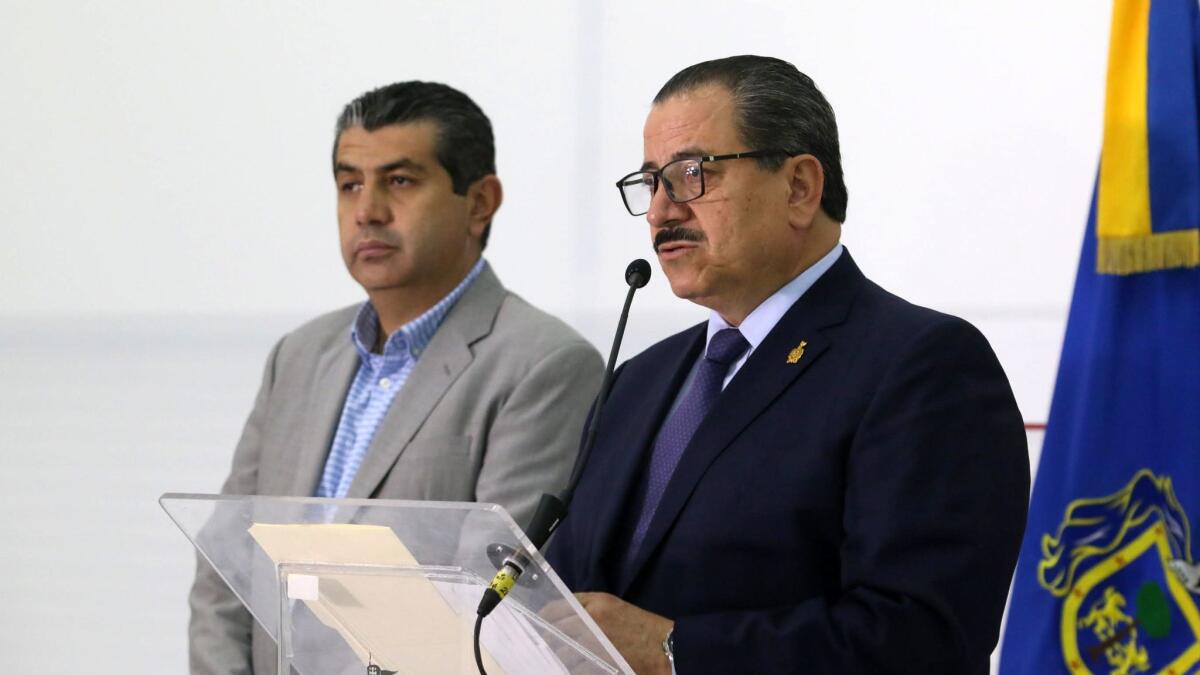Mystery surrounds disappearance of three Italians in Mexico’s Jalisco state

Reporting from Mexico City — In a country where tens of thousands have gone missing, most presumed killed by gangs, sometimes in cahoots with police, the recent disappearance of three men barely qualified as news except for one fact: they are citizens not of Mexico but of Italy.
The toll of Mexico’s escalating violence has fallen almost exclusively on Mexicans, often with only a passing mention in the press of the daily ledger of assaults, homicides and abductions.
But international scrutiny is inevitable when foreigners become victims — as happened when two Australian surfers were found dead in Sinaloa state in 2016 or when the niece of Spain’s top soccer official was kidnapped and killed in Mexico City that year.
Diplomatic intervention and the global media glare bring demands for justice, challenging Mexico’s deeply embedded culture of impunity.
The case has sparked outrage in Naples, where the Italians are from. Relatives and others marched on the streets there last weekend in a candlelight vigil demanding answers and denouncing Mexican police, who have emerged as suspects.
At a recent soccer match featuring the city’s beloved Napoli soccer team, a huge banner unfurled among the multitudes in the stadium declared: Liberate i napoletani in Messico — Free the Neapolitans in Mexico.
The three men — Raffaele Russo, 60, his son, Antonio Russo, 25, and his nephew, Vicenzo Cimmino, 29 — went missing Jan. 31 in the agricultural hub of Tecalitlan in Jalisco state, a region known for its mariachi heritage, its tasty goat stew and its narco-violence.
What the Italians were doing in isolated Tecalitlan — which has a population of 16,000 and sits 100 miles south of Guadalajara, the state capital — and how they dropped from sight has become a matter of public conjecture. Police have deployed trained sniffer dogs in an effort to find them, officials said.
The family of the missing men alleges they vanished after being detained by police. One theory floated in the press here is that the police may have turned them over to an armed gang, a plausible if unsubstantiated theory in a country where police have worked as foot soldiers for drug traffickers.
Just this month, prosecutors in Mexico City said they broke up a kidnapping ring whose leaders included at least three ex-police officers.
In Tecalitlan, state authorities have taken over security duties, and the police chief has skipped town, officials said.
The Jalisco state attorney general, Raul Sanchez Jimenez, told reporters this week that the town’s entire police force had been dispatched for additional “training” after the Italians’ disappearance. Various unconfirmed media reports stated that as many as five town cops had been arrested in connection with the case.
But Sanchez also said that the Italians didn’t come to southern Jalisco as tourists, as various media had initially reported. He suggested the three Italians were part of a ring peddling fake machinery.
The father, Raffaele Russo, had been arrested in the southern state of Campeche three years ago for selling false goods, Sanchez said. It was unclear whether Russo was ever formally charged or prosecuted in that case.
Another Italian was arrested this week in Guanajuato in central Mexico with “welding machinery ... and false invoices,” the attorney general said. He said the man had links to the three missing men but did not elaborate.
Mexican police are requesting information on the missing men from Italian diplomatic and law enforcement officials, who are cooperating in the case, Sanchez said. It is not clear if any of the men had a criminal record in Italy.
“We are seeking background from Italian authorities not only on the three, but on others who were with them,” Sanchez said, adding that a total of six men were probably working together in the machine-sales enterprise.
Asked if the disappearances could be linked to criminal gangs in the Jalisco region, Sanchez replied: “As for [organized] crime, one cannot discard, nor affirm, that what they [the three Italians] were doing may have affected some person, or some persons.”
The state is home turf of the Jalisco New Generation Cartel, considered among the country’s most ruthless drug trafficking organizations.
The family of the missing Italians says the men were not linked to Naples’ infamous organized crime networks and that Raffaele Russo is a long-time salesman who has hawked generators and other items in various countries for years.
The father is a pensioner who suffers from hypertension and sold “jackets and perfume” in the streets before arriving in Mexico last year, his son, Francesco Russo, told Spain’s EFE news agency.
On the day he disappeared, the father said in a cellphone conversation that he had gone to Tecalitlan to have a look and see if he could “earn something,” though he didn’t know anyone there, the son said. The family last contacted the father on his cellphone mid-afternoon on Jan. 31, his son said. Relatives became concerned when the father failed to respond to later calls.
“We thought maybe he had had an accident,” Francesco Russo, speaking from Naples, told EFE. “But we never thought something like this would happen.”
Antonio Russo and his cousin, Cimmino, drove to Tecalitlan later in the day to look for the missing man, Francesco Russo said. They had been staying in the city of Ciudad Guzman, 25 miles to the north. Police in Tecalitlan intercepted them, Francesco Russo said, citing telephone messages from his brother Antonio before he dropped from sight.
According to the family, Antonio Russo said in the messages that police stopped him and his cousin at a gas station, forced them to follow a motorcycle cop, and eventually surrounded them on a road. The family says it was subsequently unable to reach the pair.
Twitter: @PmcdonnellLAT
Cecilia Sanchez of the Times’ Mexico City bureau contributed to this report.
More to Read
Sign up for Essential California
The most important California stories and recommendations in your inbox every morning.
You may occasionally receive promotional content from the Los Angeles Times.









